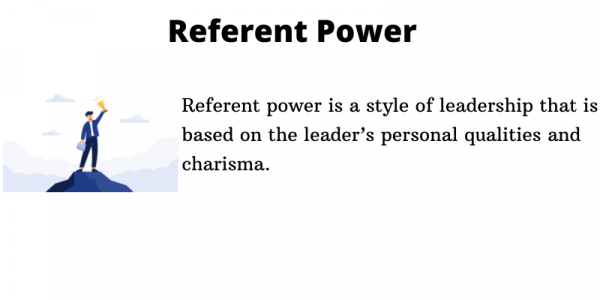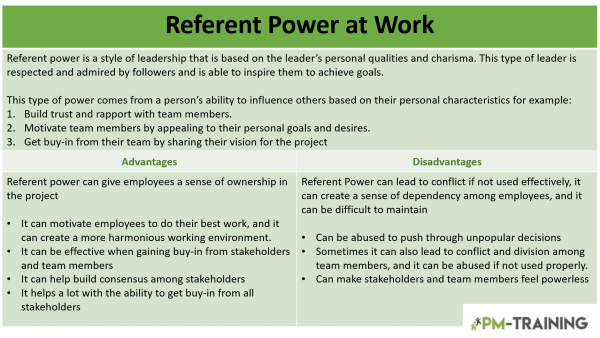Referent power is a style of leadership that is based on the leader’s personal qualities and charisma. This type of leader is respected and admired by followers and is able to inspire them to achieve goals.
It is often considered to be the most effective style of leadership, as it can lead to high levels of motivation and commitment from followers. However, it is also important to note that this style of leadership can be difficult to maintain, as it requires the leader to be consistently competent and likable.
Project managers are constantly in search of the most effective ways to lead their teams and influence, other stakeholders, in order to gain support for their projects.
Depending on the context, some leadership styles might be more effective than others.
Different power styles of project managers can influence the level of support they receive from their teams and the most effective style of leadership will depend on the specific situation and the team dynamics.
However, there are some general principles that can be applied to most situations.
For example, project managers who focus on referent power – the ability to influence others by appealing to their personal values – are more likely to gain project support than those who focus on coercive power, which is the ability to influence others through fear or force.
In addition, project managers who focus on team building and creating a positive team environment are more likely to gain project support than those who do not.

Project management is a complex field that requires the use of many different styles and techniques for project completion. One of the most important styles is Referent Power. Referent power is the ability to influence others through the use of personal attraction, charm, or prestige.
In project management, referent power is often used to motivate team members and to get them to buy into the project vision. This type of power is especially effective when the project is large and complex and when team members are uncertain about their roles.
Referent power is a valuable style for project managers. However, it is important to use it wisely and to ensure that it is used in a way that is beneficial to the project and the team.
Referent Power Examples
There are many ways in which referent power can be used in project management.
- A project manager could use referent power to build trust and rapport with team members.
- They could also use it to motivate team members by appealing to their personal goals and desires.
- An example of referent power is when a project manager is able to get buy-in from their team by sharing their vision for the project. If the team members respect and admire the project manager, they are more likely to be supportive of the project and to work hard to make it a success.
- Another example of referent power is when a project manager is able to gain the commitment of key stakeholders by winning their trust. If the stakeholders believe in the project manager’s ability to deliver on the project,
- A project manager can use their reputation to convince team members to support their decisions
How to use Referent Power?
Unlike other forms of power, referent power is based on voluntary compliance – people choose to follow you because they want to, not because they have to.
There are several ways to gain referent power.
The most important thing is to lead by example. If you want your team to be punctual, you need to be punctual yourself. If you want them to be honest, you need to be honest. And if you want them to be committed, you need to be committed.
It is important to be competent and skilled in your field.
You must be likable and approachable so that others will want to follow your lead
And finally, it is essential to be consistent in your actions and words, so that others can trust you.
Once you have gained referent power, it is important to use it wisely. It should be used to motivate others and to help them reach their

Importance of Referent Power
Project managers who have referent power are usually more successful in achieving their project goals. This is because they are able to get team members to trust and respect them. They are also able to get team members to be more invested in the project, which leads to better results.
Referent power is one of the most important types of power in project management. This type of power comes from a person’s ability to influence others based on their personal characteristics.
For example, a project manager with a strong track record of successful projects is likely to have more referent power than a project manager with a less successful track record.
It can be a very effective tool in project management, but it can also be abused.
It’s important to use referred power in a positive way, such as by setting a good example for others to follow, rather than using it to coerce others into doing things your way.
While this is not the only type of power that is important in project management, it is certainly one of the most important. If you can build referent power, you will be well on your way to being a successful project manager.
So if you’re looking to get the most out of your project team, make sure to tap into their referent power. It can make a big difference in the success of your project.
Referent Power Advantages and Disadvantages
There are many advantages and disadvantages of referent power in project management.
Advantages
Referent power can give employees a sense of ownership in the project
- It can motivate employees to do their best work, and it can create a more harmonious working environment.
- It can be effective when gaining buy-in from stakeholders and team members
- It can help build consensus among stakeholders
- It helps a lot with the ability to get buy-in from all stakeholders
- It can massively improve communication between team members
Disadvantages
Referent Power can lead to conflict if not used effectively, it can create a sense of dependency among employees, and it can be difficult to maintain
- Can be abused to push through unpopular decisions
- Sometimes it can also lead to conflict and division among team members, and it can be abused if not used properly.
- Can make stakeholders and team members feel powerless
This power can be a very effective style in project management, but it is important to be aware of the potential advantages and disadvantages before using it. Ultimately, the decision of whether or not to use Referent Power in project management depends on the specific situation and the team involved
FAQs of Reward Power in Workplace
How many types of Power styles are considered important in Project Management?
There are five main types of power in Project Management: referent power, Reward Power, Expert Power, and Formal Authority.
What are the Power Styles in Project Management?
There are four main types of power in project management: referent power, Expert power, reward power, and formal authority power. Each type of power has its own strengths and weaknesses, and understanding them is critical to being able to effectively manage a project.
How to use Referent Power in Project Management?
If you want to learn how to gain and use referent power. First, you need to be aware of the different ways that referent power can be used. Then, you need to be careful not to abuse your power or use it in a way that could backfire. And finally, you need to remember that referent power is not the only type of power that you can.
Can strong referent power potentially disadvantage a project?
It can lead to decreased productivity as team members become more interested in pleasing the referent than in completing the task at hand. Second, it can create an atmosphere of fear and intimidation, which can prevent team members from speaking up and sharing their ideas
What is Referent Power?
Referent power is the power that comes from being respected and admired by others. This type of power is often used in influence and persuasion situations. When you have referent power, people are more likely to listen to you and be influenced by your ideas.
